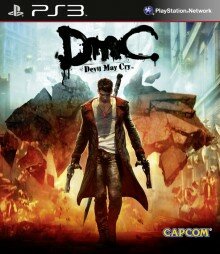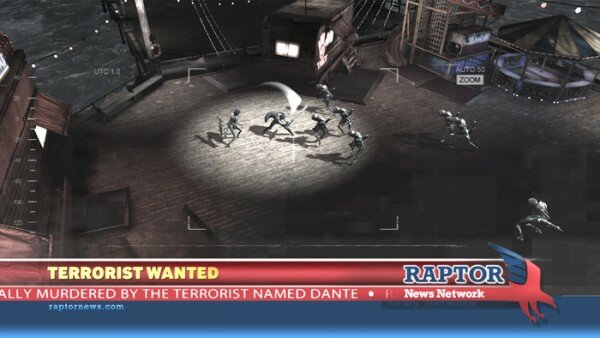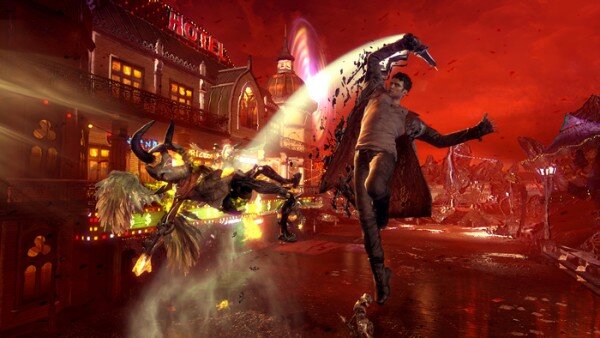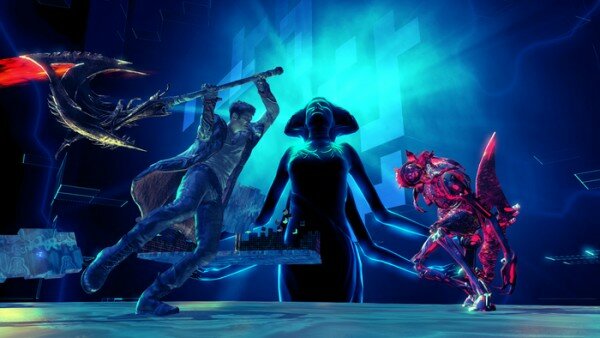Review:- DmC: Devil May Cry

Game: DmC: Devil May Cry
Format: PS3, Xbox 360, PC
Developer: Ninja Theory
Publisher: Capcom
When talking about Ninja Theory’s take on Devil May Cry it’s hard not to mention the hardcore fans’ reaction to its announcement. Featuring a younger Dante with short dark hair instead of flowing white locks, the initial reaction was… not good to say the least.
This has already been covered extensively in the past, so we’ll try not to dwell on it too much, but in short we’ve always questioned how the original Dante design, which strongly resembles British actress Jennifer Saunders, could ever be considered the model of heterosexuality.
Anyway, it turns out that the actual design of Dante has very little impact on the final product at all. Any concerns that you may have had about the game should be laid entirely to rest as DmC manages to successfully blend the traditional Devil May Cry challenging hack and slash gameplay with Ninja Theory’s other spectacular titles Heavenly Sword and Enslaved: Odyssey To The West, resulting in one of the year’s first must have titles.
DmC’s narrative looks back at the early days of Dante’s life as he begins his career as a demon slayer and wages a war against the unseen forces that have enslaved humanity. In DmC the demonic world, Limbo, exists alongside our reality, and Dante is able to shift from the real world to Limbo and engage in battle with the unspeakable forces that secretly control our lives. The story, supervised by writer Alex Garland (28 Days Later, The Beach), features a heavy dose of satire aimed directly at the American media, consumerism and our culture of debt. It’s the first Ninja Theory game to not involve actor Andy Serkis and, while the performances of the actors involved are perfectly decent, it lacks that certain sparkle that Serkis brought to Ninja Theory’s other titles.
 As high quality as the story is, the real star of the show is the phenomenally frantic gameplay. Featuring fast and fluid combat, the emphasis on each fight is to perform as many different combos as possible, earning style bonuses along the way. Dante is capable of performing an assortment of attacks that are catered to taking on specific enemy types. Heavy attacks are best suited to taking out armoured enemies, angelic weapons obliterate ghosts and demonic weapons completely destroy fiery creatures from the abyss. During each battle a combo meter, which rates your performance in real time, appears on screen that gradually fills up with each successful blow, and can only be depleted by taking damage.
As high quality as the story is, the real star of the show is the phenomenally frantic gameplay. Featuring fast and fluid combat, the emphasis on each fight is to perform as many different combos as possible, earning style bonuses along the way. Dante is capable of performing an assortment of attacks that are catered to taking on specific enemy types. Heavy attacks are best suited to taking out armoured enemies, angelic weapons obliterate ghosts and demonic weapons completely destroy fiery creatures from the abyss. During each battle a combo meter, which rates your performance in real time, appears on screen that gradually fills up with each successful blow, and can only be depleted by taking damage.
Dante has a plethora of weapons available at his disposal, including an assortment of blades, firearms and other demonic weaponry, and each can be easily linked together seamlessly to create extensive combos. It is entirely possible to get through the game by randomly bashing buttons, but it’s worth making the effort to learn how to dodge incoming attacks to avoid having to replay sections of the game over and over again. In short, as much as DmC resembles Ninja Theory’s other titles, it is very clearly a Devil May Cry game.

Each level is filled to the brim with hidden content, lost souls that need to be destroyed and keys that open secret doors. Behind each of these doors is a unique challenge, such as taking out a set number of enemies within a time limit or solving an environmental puzzle. Each lost soul destroyed, key collected, and challenge completed adds a multiplayer to your final score, and contributes to an overall rank, which can be shared on the global leaderboards.
Upon completing the main 20 story missions, which will take between 10 and 15 hours depending on skill, new difficulty modes with their own unique challenges are unlocked. With each successive difficulty the enemy type and formation changes completely, which significantly adds to the challenge. Similarly, the later difficulty modes include additional sadistic challenges, with all enemies, as well as Dante, dying in one hit. Those that are looking for a significant challenge will find plenty to occupy them in DmC.
 In summation, DmC is a rare beast – an excellent single player game that is as smart as it is stylish and filled to the brim with content. With free DLC due to land shortly, adding the wave-based Bloody Palace mode (which consists of 100 increasingly challenging battles) and paid DLC featuring Dante’s twin brother Virgil coming soon, never mind the half a dozen difficulty modes, 21 challenge rooms and online leaderbaords, there’s plenty to keep you occupied.
In summation, DmC is a rare beast – an excellent single player game that is as smart as it is stylish and filled to the brim with content. With free DLC due to land shortly, adding the wave-based Bloody Palace mode (which consists of 100 increasingly challenging battles) and paid DLC featuring Dante’s twin brother Virgil coming soon, never mind the half a dozen difficulty modes, 21 challenge rooms and online leaderbaords, there’s plenty to keep you occupied.
The Good: Smooth frenzied combat, a smart script, excellent soundtrack by Noisia and CombiChrist, loads of content, and free substantial DLC coming.
The Bad: The average gamer will likely never see most of the more challenging difficulty modes.
Overall 4.5 out of 5
If you’re a fan of hack and slash adventure games then it doesn’t really get much better than this. Buy it. Buy it now.









4 Pings